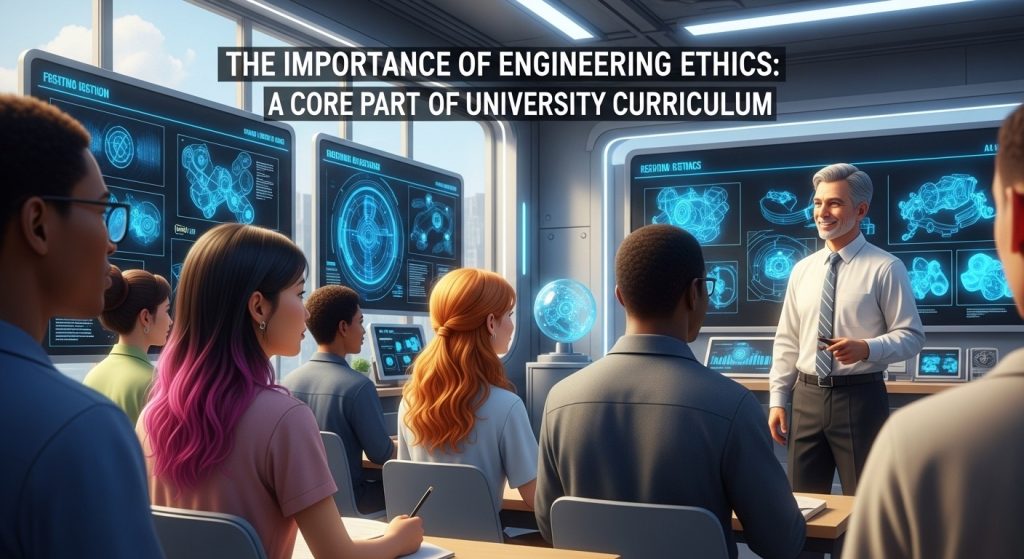Consider the recent AI ethics controversies surrounding facial recognition bias and autonomous vehicle decision-making dilemmas: these aren’t abstract philosophical debates. Tangible engineering failures with real-world consequences. As technology increasingly shapes our lives, from personalized medicine to smart cities, the engineer’s role transcends technical proficiency. We must ask, are we truly equipping future engineers to navigate the complex ethical landscapes they will inevitably face? Integrating engineering ethics into university curriculum is not merely an academic exercise; it’s a critical necessity to foster responsible innovation, ensuring our graduates are prepared to build a future that is not only technologically advanced but also equitable, sustainable. Just.

What is Engineering Ethics?
Engineering ethics is a system of moral principles that guide the conduct of engineers. It encompasses a broad range of issues, including honesty, impartiality, fairness, equity. Dedication to the protection of the public health, safety. Welfare. It’s about making responsible decisions in the face of complex and often conflicting demands, ensuring that engineering practices benefit society as a whole.
Essentially, engineering ethics is not just about following rules; it’s about developing a strong moral compass that guides engineers in their professional lives. It requires critical thinking, sound judgment. A commitment to doing what is right, even when it’s difficult.
Why is Engineering Ethics Crucial?
Engineering decisions have far-reaching consequences, affecting everything from the safety of bridges and buildings to the reliability of medical devices and the sustainability of our environment. A lapse in ethical judgment can lead to catastrophic failures, loss of life. Damage to property. Therefore, a strong understanding of engineering ethics is essential for minimizing risks and ensuring that engineering projects are carried out responsibly.
Consider the case of the Ford Pinto in the 1970s. Ford knew that the Pinto’s fuel tank was prone to rupture in rear-end collisions. They decided to proceed with production anyway, based on a cost-benefit analysis that weighed the cost of fixing the problem against the potential cost of lawsuits resulting from deaths and injuries. This decision, driven by financial considerations rather than ethical ones, resulted in numerous deaths and injuries and severely damaged Ford’s reputation. This is a stark example of what happens when engineering ethics is sidelined.
Beyond preventing disasters, engineering ethics promotes public trust in the profession. When engineers are known for their integrity and commitment to ethical conduct, the public is more likely to trust their expertise and rely on their work. This trust is essential for the continued development and advancement of engineering as a field.
The Core Principles of Engineering Ethics
While specific codes of ethics may vary between engineering societies (like IEEE, ASCE, ASME, etc.) , several core principles are universally recognized:
- Protecting Public Safety, Health. Welfare: This is the paramount obligation of engineers. They must always prioritize the safety, health. Welfare of the public in their work.
- Honesty and Integrity: Engineers must be honest and impartial in their professional judgments and avoid conflicts of interest.
- Competence: Engineers should only undertake assignments that they are qualified to perform. They must maintain their competence through continuing education and professional development.
- Confidentiality: Engineers must protect confidential insights entrusted to them by their clients or employers.
- Sustainability: Engineers should strive to design and implement solutions that are environmentally sustainable and minimize negative impacts on future generations.
Why Engineering Ethics Belongs in the University Curriculum
Integrating engineering ethics into the university curriculum is not just a nice-to-have; it’s a necessity. Here’s why:
- Early Exposure: Introducing ethical principles early in an engineer’s education helps to instill a strong moral foundation that will guide their decision-making throughout their career.
- Critical Thinking Skills: Studying engineering ethics encourages students to think critically about the ethical implications of their work and to develop the skills necessary to resolve ethical dilemmas.
- Real-World Application: Ethics courses can incorporate case studies and simulations that expose students to real-world ethical challenges that they are likely to face in their careers.
- Professional Responsibility: Learning about engineering ethics helps students comprehend their responsibilities as professionals and the potential consequences of their actions.
- Promoting a Culture of Ethics: Integrating ethics into the curriculum helps to create a culture of ethics within the engineering profession, encouraging engineers to hold themselves and their colleagues accountable for ethical conduct.
How Engineering Ethics is Taught in Universities
Engineering ethics is typically taught in universities through a variety of methods, including:
- Dedicated Courses: Many engineering programs offer dedicated courses on engineering ethics, which cover the core principles of ethics, ethical decision-making frameworks. Case studies of ethical dilemmas.
- Integration into Existing Courses: Ethical considerations can also be integrated into existing engineering courses, such as design courses, project management courses. Courses on specific engineering disciplines.
- Case Studies: Case studies are a popular and effective way to teach engineering ethics. They allow students to review real-world ethical dilemmas and to develop their own solutions.
- Simulations: Simulations can provide students with a more immersive experience in ethical decision-making. They can be used to simulate complex ethical scenarios and to allow students to experiment with different approaches.
- Guest Speakers: Inviting practicing engineers to speak to students about their experiences with ethical challenges can provide valuable insights and perspectives.
The Role of Professional Organizations
Professional engineering organizations, such as the IEEE (Institute of Electrical and Electronics Engineers), ASCE (American Society of Civil Engineers). ASME (American Society of Mechanical Engineers), play a crucial role in promoting engineering ethics. These organizations:
- Develop and maintain codes of ethics: These codes provide a framework for ethical conduct for engineers in their respective disciplines.
- Offer educational resources and training: These resources help engineers to comprehend and apply ethical principles in their work.
- Investigate ethical complaints: These organizations have processes for investigating complaints of ethical misconduct and for taking disciplinary action against engineers who violate their codes of ethics.
- Advocate for ethical practices: These organizations advocate for ethical practices in engineering through publications, conferences. Other activities.
Ethical Challenges in Modern Engineering
The rapid pace of technological change has created new and complex ethical challenges for engineers. Some of these challenges include:
- Artificial Intelligence (AI): The development and deployment of AI systems raise ethical questions about bias, accountability. The potential for job displacement.
- Data Privacy and Security: Engineers must protect the privacy and security of sensitive data in an increasingly interconnected world.
- Cybersecurity: Engineers must design and implement systems that are resistant to cyberattacks and that protect critical infrastructure.
- Sustainability: Engineers must find ways to design and implement solutions that are environmentally sustainable and that minimize negative impacts on future generations.
- Globalization: Engineers often work on projects that span multiple countries and cultures, which can raise ethical questions about cultural sensitivity and compliance with different legal and regulatory frameworks.
The Future of Engineering Ethics Education
As technology continues to evolve, engineering ethics education must adapt to meet the changing needs of the profession. Some emerging trends in engineering ethics education include:
- Emphasis on critical thinking and ethical reasoning: Future engineering ethics education will need to focus on developing students’ critical thinking and ethical reasoning skills, so that they can effectively navigate complex ethical dilemmas.
- Integration of technology into ethics education: Technology can be used to create more engaging and interactive learning experiences, such as simulations and virtual reality scenarios.
- Increased focus on emerging technologies: Engineering ethics education will need to address the ethical implications of emerging technologies, such as AI, blockchain. Biotechnology.
- Collaboration between academia and industry: Collaboration between universities and industry can help to ensure that engineering ethics education is relevant to the needs of the profession.
Real-World Application: Case Studies
Studying real-world cases provides valuable insights into the practical application of engineering ethics. Here are a couple of brief examples:
- The Challenger Disaster (1986): This case highlights the dangers of suppressing dissenting opinions and the importance of engineers speaking up when they have concerns about safety. Engineers at Morton Thiokol, the company that manufactured the space shuttle’s solid rocket boosters, warned that the O-rings were not designed to function properly in cold temperatures. Their concerns were ignored by management, leading to the catastrophic failure of the Challenger.
- Volkswagen Emissions Scandal (2015): This case illustrates the consequences of prioritizing profit over ethical conduct. Volkswagen intentionally programmed its diesel engines to activate emissions controls only during laboratory testing, allowing the vehicles to emit pollutants far exceeding legal limits during normal driving conditions. This deception harmed the environment and damaged Volkswagen’s reputation.
These cases. Many others, underscore the critical importance of engineering ethics in preventing disasters and ensuring that technology is used responsibly.
Conclusion
Engineering ethics, far from being a dry textbook subject, is the compass guiding us through the increasingly complex technological landscape. Integrating it as a core part of university curricula isn’t just about ticking a box; it’s about cultivating responsible innovators. Think about the rise of AI and autonomous systems – without a strong ethical foundation, engineers risk creating solutions that exacerbate societal inequalities or have unintended, harmful consequences. Personally, I’ve found that engaging in ethical debates with peers, even when uncomfortable, sharpens your own moral reasoning. Consider the Therac-25 incident; a stark reminder that technical brilliance without ethical foresight can be catastrophic. As future engineers, we must embrace ethical considerations not as constraints. As opportunities to build a better, more equitable world. Let’s strive to design not just innovative solutions. Ethically sound ones. The future of engineering. Indeed society, depends on it. Always remember to question, collaborate. Prioritize the well-being of all stakeholders in your projects.
More Articles
Synthetic Biology: Navigating Ethical Waters in the Realm of Engineered Life
CRISPR for Disease: How Gene Editing Could Change Treatment Forever?
Top Engineering Universities in Germany: Your 2025 Degree Guide
Personalized Medicine: Overcoming Challenges and Delivering Tailored Treatments
FAQs
Okay, so why is engineering ethics even a thing in university? It’s not like I’m going to intentionally build a faulty bridge, right?
Exactly! You probably won’t intentionally do anything unethical. But engineering ethics isn’t just about avoiding malice. It’s about navigating complex situations where there might be conflicting values, pressures from your boss, or unintended consequences of your designs. It’s about developing a moral compass so you can make the right choices, even when it’s not easy.
What kind of ‘conflicting values’ are we talking about, exactly? Gimme an example.
Think about this: You’re designing a new, super-efficient engine. Great for the environment, right? But it also means a local factory that makes parts for the old engine will likely have to shut down and lay off workers. You have to balance environmental concerns with the economic impact on the community. Ethical dilemmas aren’t always black and white – they’re often shades of grey.
So, how does learning about ethics in college actually help me deal with those gray areas?
Engineering ethics courses give you frameworks for analyzing ethical dilemmas. You’ll learn about different ethical theories, case studies of past engineering failures (and successes!). Strategies for identifying and resolving conflicts of interest. , it gives you the tools and vocabulary to think critically about the impact of your work.
Is this just some touchy-feely stuff, or are there real-world consequences for engineers who mess up ethically?
Oh, absolutely real-world consequences! Beyond just feeling bad (which is vital!) , unethical behavior can lead to revoked licenses, lawsuits, criminal charges, and, of course, irreparable damage to your reputation and the reputation of your company. Think about bridge collapses or product recalls – those often stem from ethical lapses somewhere along the line.
What are some of the core principles usually covered in an engineering ethics course?
You’ll likely cover things like honesty, integrity, fairness, responsibility. Public safety. The key idea is that engineers have a duty to protect the well-being of the public and to act in a responsible and ethical manner. It’s not just about technical competence; it’s about trustworthiness.
Okay, I get it. Ethics is essential. But is it really core to the curriculum? Can’t I just learn this on the job?
While you’ll undoubtedly learn a lot on the job, learning about ethics in a structured academic setting gives you a foundation before you’re faced with real-world pressure. It’s like learning the rules of the road before you get behind the wheel. Plus, university provides a safe space to discuss and debate these issues without the immediate consequences of a professional setting.
So, if I take an engineering ethics class, will I automatically become a perfectly ethical engineer?
Haha, no magic bullet, unfortunately! But it will make you more aware of ethical considerations, better equipped to review complex situations. More likely to make ethical choices throughout your career. It’s a continuous process of learning and reflection. The course provides a solid starting point.



